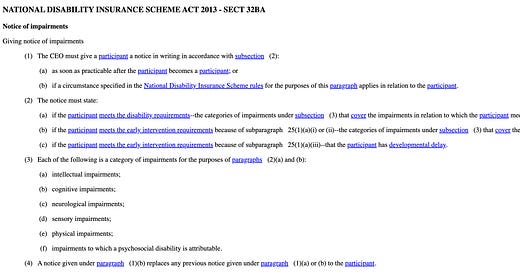NDIS Impairment Notices 101: For Providers and Participants
And what can you do about it now (besides scream into a pillow).
Yeckhgh!
That was my first thought when I heard about ‘Impairment Notices’.
What even does that mean and who the heck came up with this name? Was it a competition to see who could shift the needle even further away from the social model of disability and strengths based language?
Just as we were all getting comfy(ish) with PACE and the slow death of flexibility, the NDIA have rolled out something new called an Impairment Notice. It sounds ominous, like a warning or a fine from the Gods of Reasonable & Necessary. But in fact its a massive change from focussing on diagnosis all the time which will have major impacts both for participants and providers.
So…. let’s get into it!
Wait… What Even Is an Impairment Notice?
When we think the NDIS lexicon can’t get any weirder we get a new buzzword and its got us all feeling some kind of way.
It’s giving Sorting Hat energy but with none of the magic or consent.
Now in principal its not such a terrible thing. Impairment Notices were being framed by the NDIA as a move away from ‘diagnosis’ focus and a transition into a whole of person approach. Very human rights. We likey!
All NDIS participants will slowly be allocated into one or more Impairment Categories, and when this occurs, each participant will (should - no promises on time frames) receive an Impairment Notice - to confirm exactly which Impairment Catergory/ies they fit into.
In plain-ish English, an Impairment Notice is a formal statement the NDIA issues that says:
“Hey, this is the type of impairment (our records show) you have, and here’s how we think that typically impacts function. Based on that, here are the types of supports we’re likely to fund.”
For those who love the details, this is specified in Section 32BA of The NDIS Act 2013 as below;
These notices will be (hopefully one day) shared with you, which is a nice change from the NDIA’s usual game of Guess What The Planner Was Thinking and most importantly the Impairment Category you are allocated will impact;
the types of supports that can be funded for you; and
the types of supports you can spend your NDIS funding on.
So while the notices are being marketed as a consistency tool, what they also do is raise the bar on how closely your documentation needs to match their internal logic. If you want a yes from the NDIS for a specific support (let’s say Psychology or a Communication Device), you need to figure out if what you need funding for will line up with your Impairment Category.
Impairments are also relevant when it comes to access to the NDIS. To meet the access criteria, the Agency now also use terminology about ‘Impairments’ that cause disability, and are likely to be permanent,
So what is an ‘Impairment’ in the NDIS’s eyes?
The Operational Guideline - Applying to the NDIS states:





